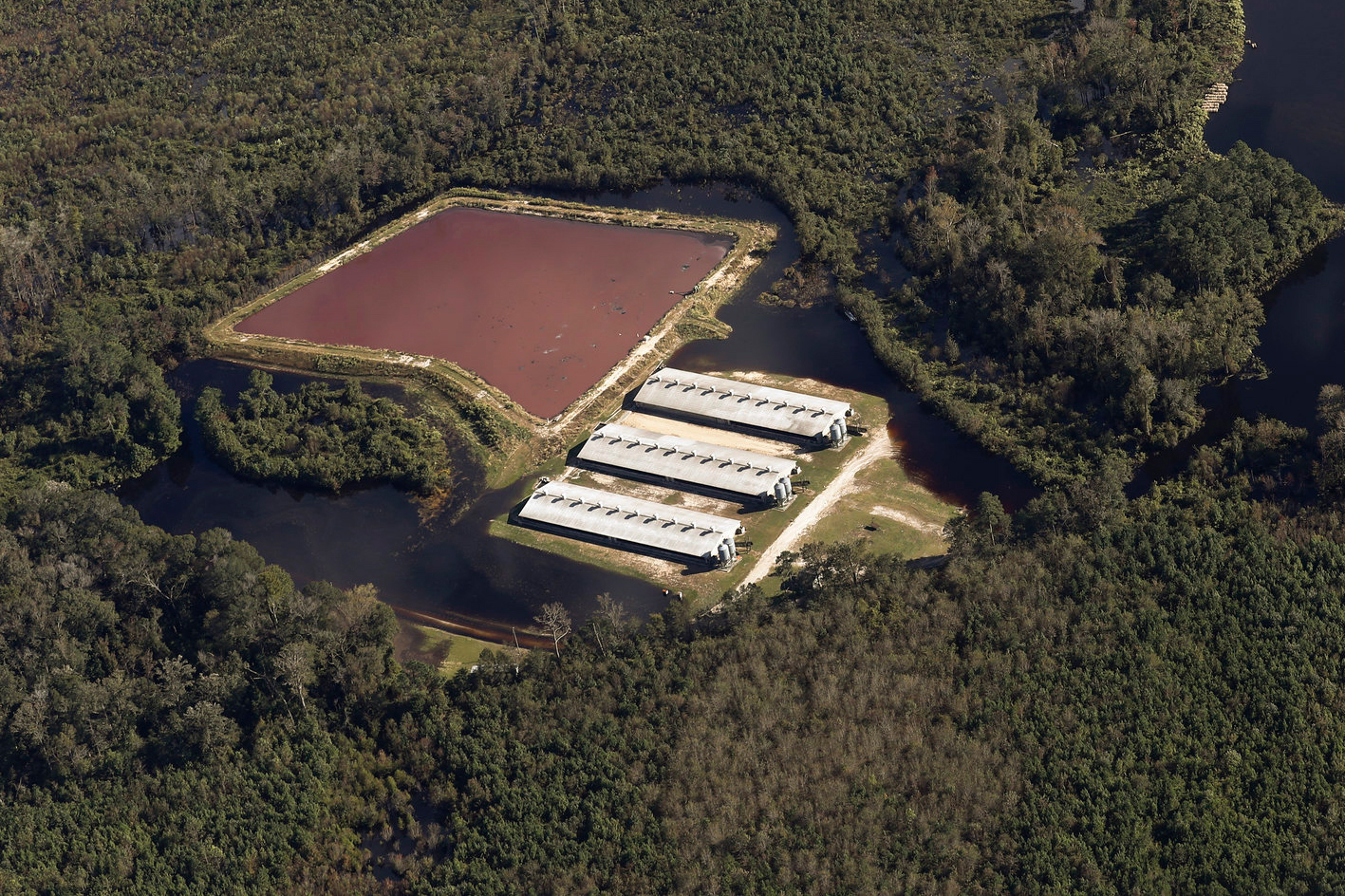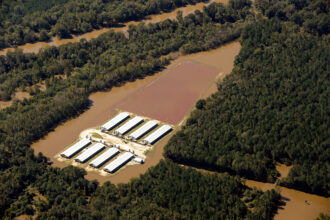The North Carolina Supreme Court has ruled in favor of a powerful agribusiness group, concluding that state regulators improperly included three specific conditions in general permits that govern industrialized hog, cattle and poultry operations.
The first included a requirement that all concentrated animal feeding operations (CAFOs) submit a short annual report summarizing their operations, including the number of animals, permitted lagoons and acres on which manure is applied.
The second and third, which applied only to a smaller subset of farms, include requirements to measure phosphorus loss from farm fields where waste is applied, and to conduct groundwater monitoring upgradient and downgradient of the lagoons.
The 5-2 decision, issued last month, split along party lines, with Republican justices in the majority. Democratic Justices Anita Earls and Allison Riggs dissented.
The ruling concludes a five-year legal dispute between the N.C. Farm Bureau Federation and the N.C. Department of Environmental Quality. The Farm Bureau had argued the state overstepped its authority in 2019 by unilaterally imposing the conditions on general permits for CAFOs.
DEQ renews general permits for CAFOs every five years, during which time it can amend them.
Instead, the Farm Bureau said, and the court’s majority agreed, that the three conditions should have gone through a rule-making process as prescribed by the Administrative Procedures Act (APA) and overseen by the state Environmental Management Commission.
“The Division may not evade the APA by using general permits to impose generally applicable regulations that have not gone through the rulemaking process,” wrote Justice Trey Allen for the majority.
In the dissent, Justice Earls argued that two of the three disputed conditions—requirements to measure phosphorus loss and to conduct groundwater monitoring—applied only to a small subset of permit holders. The court’s majority, she wrote, also misinterpreted the legal definition of a “rule.”
“The majority opinion seems to cast entire permitting regimes designed to protect public health into uncertainty,” Earls wrote. “What is at stake is the state’s ability to carry out duties assigned to it by the people and their elected representatives.”
It can take years for the EMC to approve a rule, a process that has become increasingly politicized. The 15 EMC members are appointed by the governor, state House and Senate leadership—currently Republican—and the agriculture commissioner, also a Republican.
Jake Parker, the attorney representing the Farm Bureau, told Inside Climate News that if the EMC takes up rulemaking relating to the general permits, the group “will advocate for a sensible regulatory approach that protects the environment without forcing farmers to engage in unnecessary and unproven practices.”
It is unclear if DEQ will present the three conditions to the EMC. An agency spokesman said it “is reviewing the opinion and considering how to best comply with the court’s ruling.”
The 2019 general permits remain in effect except for the provisions the court struck.
General permits for CAFOs contain 80-plus provisions, many of which did not go through rulemaking. The court’s majority “does not explain what distinguishes the three challenged provisions” from the rest, wrote Earls in the dissent.
Attorneys for DEQ argued that the provisions were not “generally applicable” because CAFOs can request an individual permit tailored to their operations.
Of the 2,000 hog CAFOs in North Carolina, 119 operate under an individual permit, according to state records, and the rest have general permits.
One of the disputed provisions would have affected just 55 CAFOs, about 3 percent of those with a general permit. Those whose lagoons lie within a 100-year flood plain would have been required to conduct annual groundwater monitoring. This data could have alerted state regulators to pollution seeping from lagoons that threatens rivers, streams and the drinking water supply.
About 5 percent of CAFOs would have been directed to measure phosphorus loss from their fields where animal waste is applied. This is important because when phosphorus enters waterways, it can feed harmful algal blooms.
This story is funded by readers like you.
Our nonprofit newsroom provides award-winning climate coverage free of charge and advertising. We rely on donations from readers like you to keep going. Please donate now to support our work.
Donate NowOnly one disputed provision would have included all CAFOs: a requirement to annually file a two-page report summarizing information from existing records, such as the number of animals, permitted lagoons and the acres on which manure is applied.
“DEQ has followed the same permitting process for almost 30 years, and the Farm Bureau has never in that time argued this or challenged permits that followed this same process,” said Blakely Hildebrand, senior attorney for the Southern Environmental Law Center, which co-represented advocates in the case.
Permit conditions must be tied back to a statute or regulation, Hildebrand said, and the disputed provisions were.
Parker said the Farm Bureau challenged the permit provisions because they contained conditions the organization opposed. The groundwater and phosphorus conditions “would impose substantial costs on farmers,” Parker said. The contents of the annual reports, “which include proprietary farm information,” could become public record.
However, that information—the number of livestock, lagoons, inspections and the acreage of sprayfields—is already public. DEQ also can redact information deemed proprietary.
North Carolina ranks second nationwide in the number of hogs raised, with more than 8 million. Most hog CAFOs are in the eastern and southeastern part of the state,
In 2014, several environmental and civil rights groups filed a complaint with the U.S. Environmental Protection Agency against DEQ. The groups alleged that state officials had discriminated against communities of color in Duplin and Sampson counties when they issued permits for hog operations, which disproportionately burdened residents with pollution sources.
Half of all hogs raised in CAFOs in North Carolina are in Duplin and Sampson counties, state records show. Half of all residents in the region are Black, Latino, Asian or Native American, according to census data.
DEQ and the advocacy groups reached a settlement in May 2018, which the EPA approved.
The three disputed conditions in the recent court case were not part of the settlement, according to a DEQ spokesman. Yet the settlement did address some of the conditions that would be considered when drafting the renewed permits.
Hildebrand said the SELC and many environmental groups have advocated for more individual permits, which would allow DEQ to address site-specific conditions at the farms. However, Hildebrand acknowledged this could be difficult, noting the legislature has cut DEQ’s funding and personnel over the past decade.
Nonetheless, she said, “I do think that more robust use of the individual permitting program, or individual permitting option is a potential path forward to deal with this situation.”
About This Story
Perhaps you noticed: This story, like all the news we publish, is free to read. That’s because Inside Climate News is a 501c3 nonprofit organization. We do not charge a subscription fee, lock our news behind a paywall, or clutter our website with ads. We make our news on climate and the environment freely available to you and anyone who wants it.
That’s not all. We also share our news for free with scores of other media organizations around the country. Many of them can’t afford to do environmental journalism of their own. We’ve built bureaus from coast to coast to report local stories, collaborate with local newsrooms and co-publish articles so that this vital work is shared as widely as possible.
Two of us launched ICN in 2007. Six years later we earned a Pulitzer Prize for National Reporting, and now we run the oldest and largest dedicated climate newsroom in the nation. We tell the story in all its complexity. We hold polluters accountable. We expose environmental injustice. We debunk misinformation. We scrutinize solutions and inspire action.
Donations from readers like you fund every aspect of what we do. If you don’t already, will you support our ongoing work, our reporting on the biggest crisis facing our planet, and help us reach even more readers in more places?
Please take a moment to make a tax-deductible donation. Every one of them makes a difference.
Thank you,











